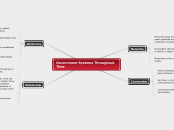Government Systems Throughout Time
Monarchy
Monarchs (kings and queens) may have all the power in the nation (absolute monarchy) or they may rule under a constitution (constitutional monarchy).
Sovereignty (the ability to rule without outside interference) is held by a single individual (the monarch).
Monarchies in the modern day include England and Saudi Arabia.
Communism
Public ownership of the means of production (machinery, tools, factories, etc.).
Karl Marx, a German philosopher, is viewed as the founder of the premier form of communism.
Communist states in the modern day include China, Cuba, and Vietnam.
Democracy
Two types: Direct (citizens make decisions) or indirect (citizens elect representatives to make decisions).
Has expanded over time. Originally, most nations/states only gave the vote to men.
The Greek city-state, Athens, is known to have established the first democracy.
Democracies in the modern day include the United States and France.
Dictatorship
Authority is held by a single person or entity. This person or entity uses oppressive techniques to keep power.
There are four ways for a dictator to gain power. They can inherit it (family dictatorship), obtain it through military force (military dictatorship), be given power by a constitution (constitutional dictatorship), or through the suspension of democratic mechanisms that were used to gain power (self-coup).
Dictatorships in the modern day include North Korea and Syria.
